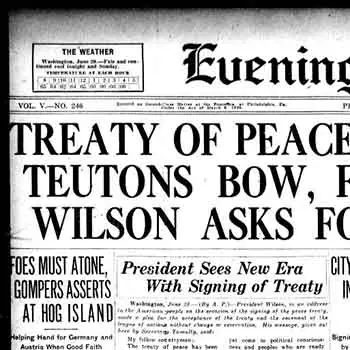Post World War 1 and Treaties
World War I ended on June 28, 1919 with the Treaty of Versailles. A treaty is an agreement between two countries. France played a large role in setting the terms of the treaty. The terms made many demands on Germany that played a key role in shaping the future and even set the stage for World War II.
First of all, men from all over the world went to Europe to fight. Many soldiers had never been more than a few miles from home. Seeing new places and meeting new people changed how they saw themselves. They saw the United States as part of a larger planet. They learned that the US was important and could affect the outcome of a world conflict. They brought those new ideas home with them. Words and phrases such as “Ooolala,” and “Merci,” became part of American speech.


But not everything the soldiers brought back with them was good. Soldiers often lived close together in large groups and dirty trenches. These conditions made many men sick and they brought their sickness back home with them. Many soldiers brought a disease called influenza home with them. As soldiers traveled home, they brought influenza to every corner of the world. People had never seen this disease before and had no real way to treat it. Millions of men, women and children died in 1918. It was called “The Influenza Pandemic.”
Russia suffered from influenza and the war. The people were hungry sick and cold. They blamed their leader for taking them into war and making them miserable. Tsar Nicholas ruled Russia with many other nobles. But the people no longer wanted the nobles in charge of their country. They captured the Tsar and his family while many other nobles fled Russia for other countries.
Instead of a king, the Russian people developed a new form of government. Instead of nobles who owned most of the wealth of the nation, the people owned everything. This form of “community owned” politics is called Communism. But before the celebrations ended, people discovered that it wasn’t just the rich that lost ownership to the state. It was everyone. So the farmer lost his fields. The shopkeeper lost his warehouses. Everything was owned by the state.

By the end of World War I, Italy had made agreements both Germany and Great Britain. They entered into peace talks intending to get as much territory as possible. They didn’t get what they wanted. Many of the territories they asked for fought in the war and earned their independence. Italy was not happy with so many small countries so close to their borders. This was one factor that led Italy to join with Germany during the Second World War.
France demanded that Germany take full responsibility for starting the war. This meant that the French blamed Germany for the entire war. The treaty also forced Germany to pay reparations. Reparations are a way for people or countries to pay for their actions. France ordered Germany to pay them for the damage the war had caused. Germany had to pay several billion dollars. The treaty also stated that Germany could not build an army or own any military vehicles such as tanks, airplanes or warships.

These rules placed a hardship on the German people. The country had paid a lot of money to fight the war. After the treaty, they had to pay more money to France. Soon, the German economy was in ruins. No one could find a job. Food and clothing cost more than most people could pay. Germans began to leave the country to find work and start a new life. But many countries didn’t welcome German people because of the war. Those who stayed at home suffered hardship and humiliation. Many years later, a young politician would promise the people pride. He said he would stop the payments to France and rebuild Germany’s military. He said that it was German destiny to rule the earth. His name was Adolf Hitler and he would plunge the world into World War II.



